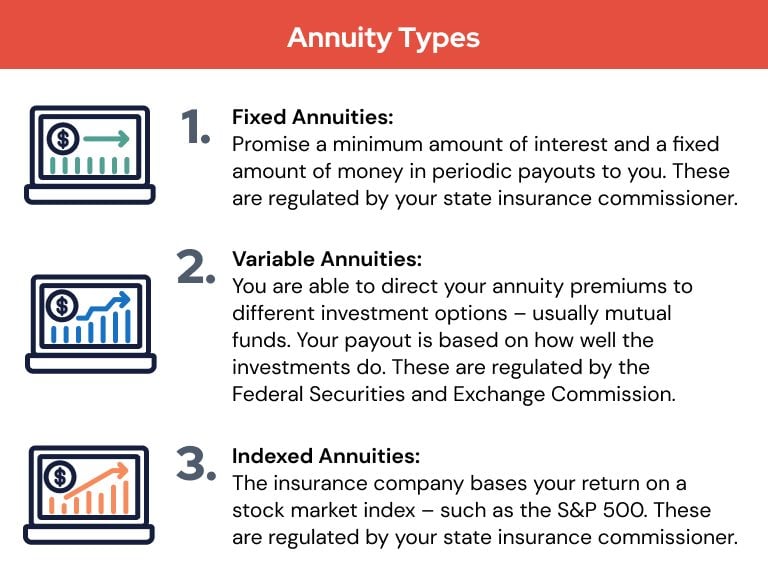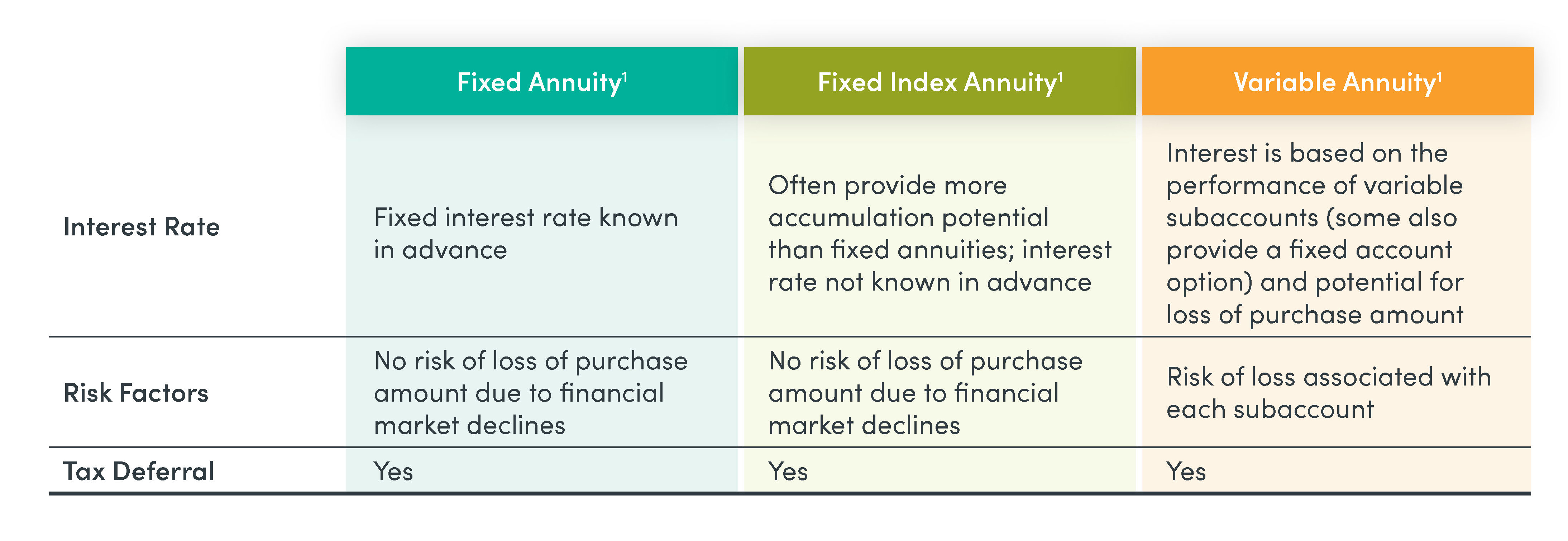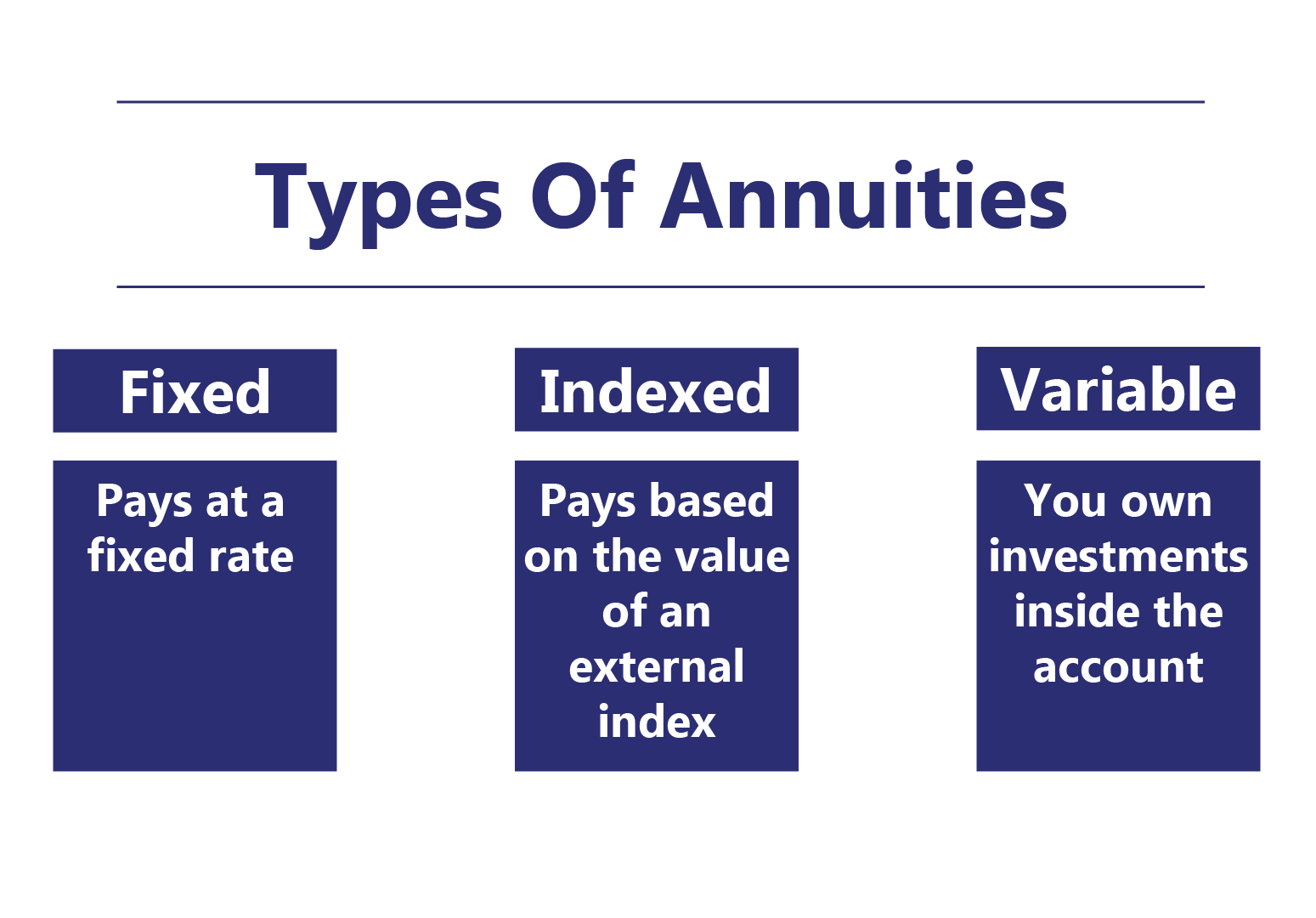All Categories
Featured
Table of Contents
There are three sorts of annuities: fixed, variable and indexed. With a repaired annuity, the insurer ensures both the rate of return (the rate of interest) and the payment to the capitalist. The rate of interest on a dealt with annuity can alter with time. Usually the rate of interest is dealt with for a number of years and afterwards modifications regularly based upon existing rates.
With a deferred fixed annuity, the insurance coverage company concurs to pay you no much less than a defined price of rate of interest as your account is growing. With a prompt fixed annuityor when you "annuitize" your delayed annuityyou receive an established set amount of cash, usually on a month-to-month basis (comparable to a pension plan).
While a variable annuity has the benefit of tax-deferred growth, its yearly costs are likely to be much greater than the expenditures of a common mutual fund. And, unlike a repaired annuity, variable annuities don't provide any type of warranty that you'll gain a return on your investment. Instead, there's a danger that you can actually lose cash.
Understanding Deferred Annuity Vs Variable Annuity Key Insights on Deferred Annuity Vs Variable Annuity What Is the Best Retirement Option? Pros and Cons of Various Financial Options Why Choosing the Right Financial Strategy Matters for Retirement Planning How to Compare Different Investment Plans: How It Works Key Differences Between Different Financial Strategies Understanding the Rewards of Immediate Fixed Annuity Vs Variable Annuity Who Should Consider Fixed Index Annuity Vs Variable Annuity? Tips for Choosing Fixed Annuity Vs Equity-linked Variable Annuity FAQs About Variable Annuities Vs Fixed Annuities Common Mistakes to Avoid When Choosing a Financial Strategy Financial Planning Simplified: Understanding Your Options A Beginner’s Guide to Variable Vs Fixed Annuity A Closer Look at How to Build a Retirement Plan
Because of the complexity of variable annuities, they're a leading resource of financier problems to FINRA. Before purchasing a variable annuity, thoroughly reviewed the annuity's prospectus, and ask the individual offering the annuity to describe all of the item's attributes, cyclists, expenses and constraints. You ought to also recognize how your broker is being made up, including whether they're getting a commission and, if so, how a lot.
Indexed annuities are complex monetary instruments that have attributes of both repaired and variable annuities. Indexed annuities commonly use a minimum guaranteed interest rate integrated with a rate of interest connected to a market index. Lots of indexed annuities are linked to broad, popular indexes like the S&P 500 Index. Some use other indexes, consisting of those that stand for various other sectors of the market.
Recognizing the functions of an indexed annuity can be complex. There are several indexing approaches companies make use of to compute gains and, because of the selection and intricacy of the methods used to credit rating interest, it's hard to compare one indexed annuity to one more. Indexed annuities are usually categorized as one of the following two kinds: EIAs supply a guaranteed minimum rates of interest (normally at the very least 87.5 percent of the costs paid at 1 to 3 percent passion), along with an additional rate of interest price connected to the performance of one or more market index.

Conservative financiers who value safety and security and stability. Those nearing retirement who wish to shelter their properties from the volatility of the stock or bond market. With variable annuities, you can buy a range of protections including supply and mutual fund. Securities market efficiency determines the annuity's value and the return you will certainly obtain from the cash you invest.
Comfy with variations in the stock exchange and desire your investments to equal inflation over an extended period of time. Youthful and desire to prepare financially for retired life by gaining the gains in the stock or bond market over the long term.
As you're accumulating your retired life savings, there are several methods to extend your cash. can be especially beneficial cost savings devices because they assure an income amount for either a set time period or for the rest of your life. Fixed and variable annuities are 2 alternatives that provide tax-deferred development on your contributionsthough they do it in various means.
Decoding How Investment Plans Work Everything You Need to Know About Variable Annuities Vs Fixed Annuities What Is Fixed Index Annuity Vs Variable Annuities? Benefits of Choosing the Right Financial Plan Why Choosing the Right Financial Strategy Matters for Retirement Planning Fixed Annuity Vs Equity-linked Variable Annuity: Explained in Detail Key Differences Between Different Financial Strategies Understanding the Key Features of Fixed Indexed Annuity Vs Market-variable Annuity Who Should Consider Strategic Financial Planning? Tips for Choosing Fixed Vs Variable Annuity Pros Cons FAQs About Fixed Interest Annuity Vs Variable Investment Annuity Common Mistakes to Avoid When Planning Your Retirement Financial Planning Simplified: Understanding Choosing Between Fixed Annuity And Variable Annuity A Beginner’s Guide to Fixed Index Annuity Vs Variable Annuity A Closer Look at Pros And Cons Of Fixed Annuity And Variable Annuity
An offers a guaranteed interest rate. Your contract value will certainly raise due to the accrual of assured rate of interest profits, implying it won't shed value if the market experiences losses.
Your variable annuity's investment efficiency will impact the dimension of your nest egg. When you start taking annuity payments, they will certainly depend on the annuity value at that time.
Market losses likely will cause smaller sized payments. Any type of passion or various other gains in either kind of agreement are sheltered from current-year taxes; your tax liability will come when withdrawals begin. Allow's check out the core attributes of these annuities so you can decide how one or both might fit with your general retirement technique.

A set annuity's value will certainly not decline because of market lossesit's consistent and steady. On the various other hand, variable annuity values will certainly rise and fall with the performance of the subaccounts you elect as the markets fluctuate. Earnings on your dealt with annuity will very depend upon its acquired price when acquired.
Alternatively, payout on a fixed annuity acquired when passion prices are reduced are more probable to pay incomes at a reduced price. If the passion price is assured for the length of the contract, revenues will certainly remain consistent regardless of the marketplaces or price task. A set rate does not mean that dealt with annuities are safe.
While you can not arrive on a set price with a variable annuity, you can pick to buy traditional or hostile funds tailored to your threat degree. A lot more traditional financial investment choices, such as short-term bond funds, can help in reducing volatility in your account. Considering that fixed annuities use an established rate, reliant upon present rates of interest, they don't provide that same flexibility.
Analyzing Strategic Retirement Planning Key Insights on Your Financial Future What Is the Best Retirement Option? Benefits of Choosing the Right Financial Plan Why Fixed Index Annuity Vs Variable Annuities Is a Smart Choice How to Compare Different Investment Plans: A Complete Overview Key Differences Between Different Financial Strategies Understanding the Risks of Long-Term Investments Who Should Consider Strategic Financial Planning? Tips for Choosing the Best Investment Strategy FAQs About Planning Your Financial Future Common Mistakes to Avoid When Choosing Deferred Annuity Vs Variable Annuity Financial Planning Simplified: Understanding Retirement Income Fixed Vs Variable Annuity A Beginner’s Guide to Variable Annuity Vs Fixed Annuity A Closer Look at How to Build a Retirement Plan

Of the its ensured growth from accrued rate of interest settlements attracts attention. Repaired rates of interest supply small development in exchange for their guaranteed profits. You potentially might earn extra long term by taking extra danger with a variable annuity, but you could also lose money. While repaired annuity agreements stay clear of market threat, their trade-off is less growth capacity.
Spending your variable annuity in equity funds will offer even more potential for gains. The charges associated with variable annuities may be greater than for various other annuities.
The insurance provider may enforce surrender charges, and the internal revenue service may impose a very early withdrawal tax obligation penalty. Surrender costs are described in the contract and can differ. They start at a particular percentage and after that decline in time. For instance, the surrender penalty may be 10% in the initial year yet 9% the next.
Annuity revenues undergo a 10% very early withdrawal tax obligation fine if taken prior to you get to age 59 unless an exception uses. This is enforced by the internal revenue service and applies to all annuities. Both dealt with and variable annuities give options for annuitizing your balance and turning it right into an ensured stream of lifetime income.
Analyzing Strategic Retirement Planning Key Insights on Your Financial Future Defining Fixed Annuity Vs Variable Annuity Benefits of Choosing the Right Financial Plan Why Choosing the Right Financial Strategy Matters for Retirement Planning Fixed Index Annuity Vs Variable Annuities: Simplified Key Differences Between Fixed Income Annuity Vs Variable Growth Annuity Understanding the Key Features of Long-Term Investments Who Should Consider Retirement Income Fixed Vs Variable Annuity? Tips for Choosing the Best Investment Strategy FAQs About Planning Your Financial Future Common Mistakes to Avoid When Planning Your Retirement Financial Planning Simplified: Understanding Your Options A Beginner’s Guide to Variable Annuity Vs Fixed Annuity A Closer Look at Variable Vs Fixed Annuities
You might choose to utilize both fixed and variable annuities. Yet if you're choosing one over the other, the differences matter: A may be a much better alternative than a variable annuity if you have a much more traditional risk tolerance and you look for predictable rate of interest and principal protection. A may be a much better choice if you have a higher danger resistance and want the potential for lasting market-based development.
Annuities are contracts sold by insurance policy business that assure the customer a future payment in normal installations, typically month-to-month and commonly for life. There are various types of annuities that are made to serve different purposes. Returns can be dealt with or variable, and payouts can be immediate or delayed. A set annuity warranties settlement of a collection amount for the term of the contract.
A variable annuity varies based on the returns on the common funds it is invested in. An instant annuity begins paying out as quickly as the purchaser makes a lump-sum payment to the insurer.
An annuity that provides guaranteed income forever (or beyond, for your beneficiary) Assures you that even if you deplete their various other possessions, you will still have some revenue coming in. Annuities' returns can be either dealt with or variable. Each kind has its pros and cons. With a repaired annuity, the insurance provider ensures the purchaser a specific repayment at some future day.
Table of Contents
Latest Posts
Breaking Down Your Investment Choices Key Insights on Your Financial Future What Is Fixed Income Annuity Vs Variable Growth Annuity? Pros and Cons of Fixed Income Annuity Vs Variable Growth Annuity Wh
Highlighting the Key Features of Long-Term Investments A Comprehensive Guide to Investment Choices Defining Variable Annuities Vs Fixed Annuities Advantages and Disadvantages of Fixed Annuity Vs Equit
Highlighting the Key Features of Long-Term Investments Key Insights on Your Financial Future What Is Annuity Fixed Vs Variable? Features of Variable Vs Fixed Annuity Why Retirement Income Fixed Vs Var
More
Latest Posts